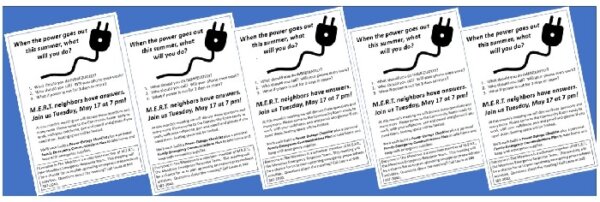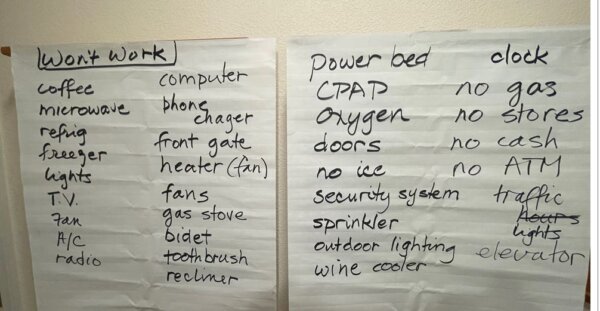
This week’s Advisory on power outages has a couple of possible uses.
- You can use it to confirm or add to your own understanding of the topic. (I almost always seem to be in the “adding to” mode!)
- It is also an Advisory that can serve as a kickstart for training others. In my case, “others” are my neighbors here in our senior community. Your training may be for a group of Scouts, or a church group, a school classroom, or a “lunch and learn” session with colleagues at work.
Since this week we actually did hold a meeting on summer power outages, I’ve laid out the Advisory so you can use it as a “lesson plan” for your own group!
Goal for this training session: Get people so involved that they go home and make some changes in their level of readiness!
Start with background material on summer power outages for your community (5-10 min)
According to the government, the average utility customer experiences only about 2 hours a year of power outages. However, when we count in “major events,” that average shoots up – to 8 hours in 2020 (latest year for statistics).
Ordinary interruptions are caused by weather and plants/tree limbs falling on or tangling up power lines. Other interruptions come from the utility’s “planned outages” for repairs. Still others are “rolling blackouts,” meant to relieve stress on a grid during a period of high demand.
OK, so those are familiar interruptions. A few minutes or a couple of hours now and then.
Unfortunately, you may have had experience with “major events,” too. We’ve written about some of them here: snowstorms, hurricanes and, of course, wildfires.
Because we just got a warning from our utility, we mustn’t overlook Public Safety Power Shutoffs. This 3 min. video tells the story — from the point of view of our local utility!.
PSPSs happen when the utility deliberately shuts off the power because high wind conditions threaten wildfires. Here in California, PSPS can last for hours or for as many as 7 days!
Conduct Group Exercise: “What stops working when the power goes out?” (10-15 min.)
Needed: Paper for everyone to write on. Pens. Easel/white board and a scribe with fat black pen to record answers. If necessary, hand-held microphone so leader can move from table to table to collect input. Items for “show and tell.”
Gather answers:
Pose the “What stops working?” question above. Give people 3 minutes to write down their answers. Table members can share and combine answers if they want. (We were surprised at the delay before people started writing! Maybe they had never considered this question before???)
Now, ask each table for its answers. Transmit them to the scribe so they are recorded in a way everyone can see them. Naturally, there will be duplication. Have the scribe add just new items as they emerge.

As the list of “What stops working?” grows, people will begin to call out more and more items. This is where it gets fun and creative! (Our group came up with these answers, shown here on the first two easel pages. Love those sticky backed sheets.)
Hand out FEMA flyer:
In preparing for this program, we found an excellent flyer produced by FEMA, downloadable here.
(Multiple printed copies are also available FOR FREE from the FEMA library. For my group I ordered 50 copies, along with several other publications, in a couple of languages. It took about 3 weeks for everything to arrive from the distribution center in Colorado. Link to library: https://www.ready.gov/publications#: )

The FEMA flyer has two pages full of good tips. On the back, it suggests building a personal plan with three sections.
One: How to Prepare Now
Two: How to Survive During the Outage
Three: Be Safe in a Long-Term Outage
Start group members on building individualized three-part plans (1 min)
Have participants divide their own paper into three sections: Now, During and Long-term. Tell them to get ready to add “to-do” suggestions in each category as the group goes through its list of “what stops working.”
Go over details for every pertinent item in the list of “What stops working.” Cover what to expect and explore alternatives. This is the meat of the discussion! (35-45 min)
As leader, you may want to do some research in advance on particular items that you know are likely to come up. The FEMA flyer can be a start. Members of your group will also have experiences and knowledge to share. Finally, at the end of the evening, you may want to ask for volunteers to do further research for future sessions.
Some of the questions that arose in our group:
- “Will my phone work in a power outage?”
We discussed cell phones, portable phones, cable modem set-ups, hardwired phones – and all the various battery back-up plans offered by different providers. We also handed around power banks (flat ones, round ones, solar back-up) and car chargers. People wanted to know where to get them and what they cost. - “What about back-up power for medical devices?”
In our senior community we have plenty of powered medical assistance equipment: power chairs and beds, CPAP machines, oxygen concentrators. We have discovered that SOME utilities offer free back-up equipment to people registered on medical “lifeline” programs. Some utilities offer back-up devices for sale. Every customer needs to do their own research. Here’s an example of a versatile power station that could work for several medical devices. - “What about prescriptions that need to be kept refrigerated?”
Some of our new neighbors were unaware of how quickly food spoils when the refrigerator stops working. We emphasized stories of using food up quickly and efficiently. (You’ve heard about the Community Power Outage Picnic, right?). And no one in our group knew how long their refrigerated medicines would last without cooling! Suggestions were made about how to manage food in the refrigerator, and also how to be ready with a separate cooler for insulin, like this one - “What’s the best lighting at night if the power is off?”
Once again, we had plenty of examples: plug-in emergency LED lights, battery-operated collapsible lanterns, solar garden lighting, glow sticks, motion activated lights (sold for closets), and battery-powered candles. We repeated our usual warning: NO LIVE CANDLES in an emergency! (A home in our neighborhood burned to the ground last year because the resident fell asleep with candles burning . . .) - “How do we get out of this building if the automatic doors don’t work?”
When this question came up, I turned off all the lights in the room! In the dark, we talked about the importance of knowing where ALL the exits are. People were reminded that doors with breaker bars are meant to be pushed open! (A power outage several years ago “trapped” some uninformed neighbors inside the building for a half hour!)
And when the meeting was over ?
At the end of the evening, people went home clutching various to-do lists. Most important, everyone had participated in identifying problems associated with summer power outages. Most had helped come up with do-able and affordable solutions.
We didn’t even get into the generator/inverter discussion for more comprehensive solutions to summer power outages. That will be perfect for a follow-up meeting!
Is all this familiar to you and your family? If so, congratulations. For community leaders, though, the question is, “Do all your neighbors know these power outage basics?” It’s worth spreading the word, because summer power outages are surely coming!
Virginia
Your Emergency Plan Guide team
Don't miss a single Advisory.
Thank you for subscribing.
Something went wrong.
